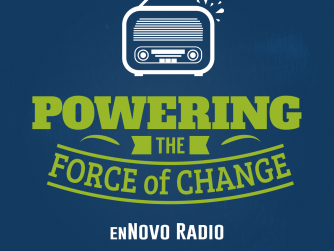
Reading through books of Moses (Genesis to Deuteronomy), we see how God led the people of Israel on their journey into the Promise Land. That journey mirrors much of our journey into faith. It is a journey into the depths of a relationship with God. In this post, I want to examine how God guided the nation, how they followed, and how that carries over into the journey God has in store for us.
1. The Israelites were led by the visible God
Scripture tells us that God led the nation through two visible signs. During the day, a cloud would lead them and during the evening journeys a pillar of fire would go before them. When God decided to stop, the cloud would stop and the people would settle in for an undetermined period of time. During this time the tabernacle would be assembled and the cloud would hover over the dwelling place of God. When it was time for the journey to continue, the cloud would rise, at which time the people would pack up the tabernacle and their own possessions and be prepared for the cloud to lead them through the next part of the journey.
2. The Disciples were led by the visible Son
God, live and in the flesh, led the disciples for three years. Each day Jesus would hear from God and the journey would begin anew. He took them from one end of Judah to the other, through Samaria, around and back again as He journeyed to the cross. The disciples did not know where the journey would lead from one day to the next. Rather, it was a dependance on God the Son each day.
Jesus told Thomas something fascinating post-resurrection. “Thomas”, Jesus said, “it is great that you see and believe. But what’s better will be all those who do not see yet still believe.” A few days later, Jesus ascends. A few days later we read about Pentecost.
3. Christ Followers are led by the invisible Spirit
From the ascension of Jesus until today, followers of Christ (people who do not see but still believe) have been led by the invisible Holy Spirit. That just doesn’t seem fair does it? Well, maybe not, but at least we don’t have to wait centuries between God speaking into our lives.
The difference between God leading visibly (as in the case of the nation and the disciples) and invisibly as He leads Christ-followers is that the visible God was external to the people whereas the invisible Spirit resides within each follower of Christ. The visible is not as important in our case because the invisible is always there, prompting us, teaching us and leading us.
However, there is a similarity between the Israelites after the construction of the Temple and today’s Christ-followers. During that time, the nation heard from God through dreams, visions, natural disasters, war and slavery. They also had prophets who themselves heard from God and spoke that word to the people. He even spoke in a still, small voice and through a donkey. Post-Pentecost, we see something similar. God spoke to people through visions, trances, and dreams (Acts 10:3-16), He spoke though prison sentences, an inner voice (Acts 16:1-10) and visitations from God or his messengers (Acts 23:11). Despite the invisible nature of God, he still leads experientially. Guidance is done through encounters.
Faith Markers
Along the journey through the desert, God provides faith markers to the nation to show them that not only was He still around, but He was listening and He was providing all of their needs. Whether it was manna for food or water to drink or forty years in the desert without the need for new clothes or shoes, God took care of them one day at a time.
For post-Pentecost Christians, God provides us with faith markers as well. Several years ago, during my senior year in college, I came home from the morning service, which has been quite inspiring, and sat down in my “thinking chair,” at the time it was a dirty yellow queen anne chair. It has since been re-covered and it is still my thinking chair. I put on some classical music and just closed my eyes and quieted my mind. While it wasn’t audible, it was loud in my spirit. God posed to me a question: “David, what do you want?” Without hesitating, I told God three things that I truly wanted. And no, they did not include gobs of money, fancy cars, or trivial stuff like that. They were things only God could do. For the next year, God answered each one of those. Two he provided. One he did not. However, for a year I prayed and waited and watched. That period of my life has become a faith marker. When I struggle with God and where He is leading me, or when He seems silent and far off, I go back to that period in my life and, in the words of Rich Mullins, it keeps “giving me hope to carry on.”
Those faith markers are emotional connecting points that are important in following God on this journey into faith. They are important reminders of how God has provided in the past. They keep us going as He takes us deeper into faith, particularly because He will take us through deserts where we walk into a fierce sandstorm that tests our dependence and obedience upon God.
The Goal
As I read the story of the Israelites, the disciples time with Jesus and examine my own life experience with God, I notice something important about God’s goal in how He leads us. His goal is day-by-day leadership.
If you notice how He guided the nation, they had to be ready at a moments notice to pack up and move. They could not plan into the future. They would wake up each morning knowing that today might be the day for transition. Tomorrow was never really planned. The disciples experienced the same kind of guidance. They woke up each morning not knowing what the day would bring, where they would journey next, or who they would encounter. Each day was a day of the unknown.
The past two years of my life have been a period where I longed to see God move and work. But all I have heard is silence. With me wanting to know where and when and to what God may lead us, God has chosen to rest us right where we are. There has come a point in this two year journey that I transitioned from wanting to know five years out, two years out, even a year out what God would have us do to waking up each day and asking God what He had in store for me today.
I keep going back to the Lord’s prayer quite often. There’s that part of the prayer where Jesus prays, “Give us this day our daily bread…” I paraphrase this verse according to what I believe is its intended meaning: “Give me today what I need for today and tomorrow I will come back to you and ask you again.”
The goal of the journey into faith is a total day-by-day, moment-by-moment dependence on the leadership and guidance of God. For a society enamored by goals and plans, this causes us discomfort. But the truth is, every morning we wake up to could be a day of transition. It could be the day that a loved one dies or a home is destroyed or a job is lost. It could be the day that brings great news, notice of a new job, or a move across the country. We are not promised the next second, much less the next day, month or year. We need to anticipate that each moment is a moment of transition and change.
That sometimes means God becomes silent for a period of time. That period of time can be so quiet that it screams at us, a period of time that St. John of the Cross calls the dark night of the soul. We so long for God to speak, to give us any light at the end of the tunnel (even if it is a train) that we spend every available moment crying out to Him. His silence is both exhausting and thirst-creating, so much in fact that we keep coming back for more. In doing so, He is removing our own self-reliance and developing our God-dependence. As much as we have tried to lead ourselves by our dreams, goals, and desires, we fall before Him to wake up each morning asking Him what He wants us to do today.
There comes a point in time, and it is different for each person, that this day-by-day dependence becomes our dearest friend instead of worst enemy. We learn to embrace it. We look forward to what God will provide for us today.






